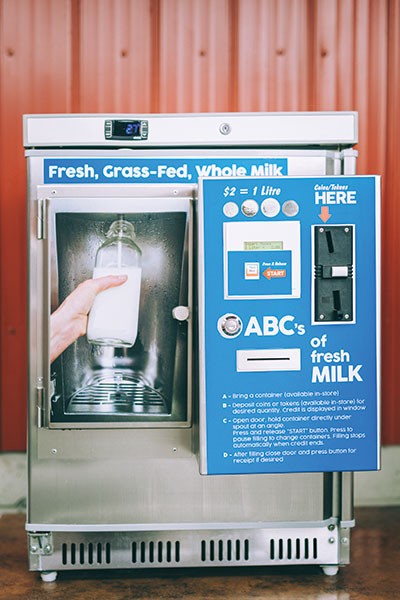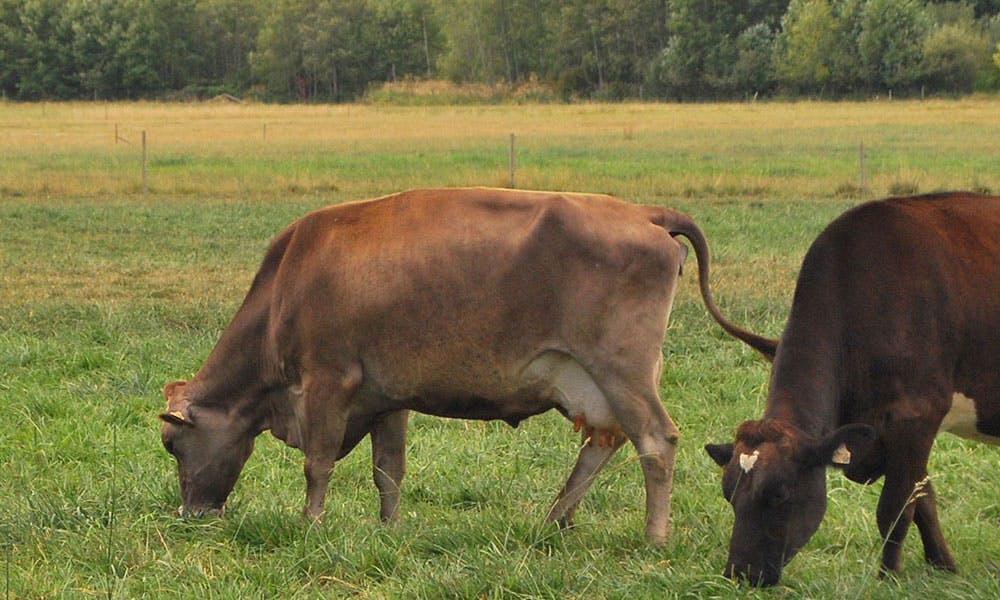The BC Dairy Where Cows are in Charge
Vancouver Island’s Morningstar Farm prioritizes a happy herd and a healthy ecosystem.
Cows grazing on Morningstar Farm’s pasture
The cows call the shots on Morningstar Farm. At this Vancouver Island dairy, cows are milked when they feel like it. Raymond Gourlay — who runs Morningstar with his mother, Nancy Gourlay — says the 47-head herd of Holsteins and Brown-Swiss/Holstein-crosses eats and rests more, and lines up less, than at a conventional farm.
Any time she wants — and as often as she likes — a Morningstar cow steps into the farm’s automated DeLaval Voluntary Milking System. A computer chip in her collar signals the system’s robot to clean her udder and attach an automatic milker to each teat, standing in for the worker who would once have attached a vacuum milker for twice-daily milkings. The chip also monitors her health and tracks output as she’s milked. “It’s a win for the animals,” Gourlay says.
When Gourlay’s own son was born five years ago, he realized the problem with milking twice a day. Just like for nursing humans, frequent milkings are better for cows’ comfort and health. So the dairy went robotic. “They’re on their own schedule and they can express more of their natural behaviour when we cater to individual needs,” Gourlay says.
The milk is used quickly, pumped across the farmyard to Morningstar’s dairy business, Little Qualicum Cheeseworks. It’s made into a variety of raw-milk hard cheeses, while soft cheeses like brie are made from heated milk. Old Smoky is the newest product, a smoked hard cheese launched in spring 2020.
All robotic milking systems are voluntary for the cow. But the technology is also good for humans.
The first robotic milker in North America was used on an Ontario dairy farm in 1999. But they’re still far from commonplace. They’re expensive: A typical machine costs in the range of $200,000. About 25% of British Columbia’s 70,000 dairy cows are milked by robotic systems, says Brian Rodenburg, owner of West Coast Robotics in Agassiz, BC. The company sells the Lely Astronaut Milking System, used by BC dairy operations ranging from a single machine serving 25 cows, up to 31 milkers on a Chilliwack operation with a herd numbering 1,700.
All robotic milking systems are voluntary for the cow. But the technology is also good for humans, freeing up farm staff to focus on monitoring the herd for problems, rather than spending time milking at 5 am and 5 pm. “It’s a tool that makes good farmers better,” Gourlay says. With the robotic milker, Morningstar’s average per-cow production went from about 32 litres a day to 40 L, increasing output without growing the herd.
Morningstar cows also get some pampering from two automatic “massage” stations at either end of the barn. Large car-wash-style brushes spin when a cow leans into them, scratching all her hard-to-reach spots. They’re busy throughout the day.
The 36-hectare farm just outside Parksville — about two hours north of Victoria — supports life beyond its domesticated residents, in fields, ponds, streams, and forest. Migratory trumpeter swans winter there. Waterfowl nest by the ponds and swallows stay part of the year. Deer are regular visitors; even elk pass through occasionally.
Streams are fenced off so cows can’t drink from them, preserving water health by keeping the area free of their urine and feces. Grass grown year-round — instead of the seasonal corn often cultivated as feed by dairy farms — avoids nutrient runoff (when spring thaw and rain washes fertilizers and soil from bare winter fields into streams and ponds). And permanent pasture “is an excellent carbon sink,” Gourlay says.
Plus, he adds, the result is “just a better-tasting milk.”
The farm-as-habitat approach was championed by Gourlay’s late father, Clarke, who established Morningstar with Nancy in 2004. Gourlay calls it the “philosophy of abundance.” “There is enough for everyone,” he says. “The wild animals, farm animals, people who live here, and the visitors who come to experience the farm.”
There is enough for everyone: the wild animals, farm animals, people who live here, and the visitors.
Those people include Raymond’s wife, Rebecca, five-year-old Kieran and two-year-old Dahlia, his mother, and his brother John, who works as a herdsman. Morningstar’s human population also includes 18 employees at the farm, cheeseworks, and retail areas. In summer, as many as 400 visitors a day take free, self-guided tours of the barns and dairy farm museum.
As with everywhere else, the Covid-19 pandemic changed life and work at Morningstar. Public access and retail areas closed in March. “This is people’s lives and livelihood,” says Gourlay. “We wanted to keep operating as much as is safe and reasonable, without putting staff at risk.” The cheeseworks continued making cheese for sale by retailers across BC. The dairy began home delivery of about 200 L of milk twice a week, and the farm store switched to online sales. Gourlay estimates business dropped by 80%.

Morningstar Farm had to shut down its milk dispenser at the beginning of the Covid-19 pandemic, but was able to reopen it in June.
The farm’s beloved milk vending machine was also temporarily shut down. It has since re-opened. The automatic milk growler-filler — or should that be “moo-ler”? — usually dispenses a litre of fresh, pasteurized, cream-top milk for a toonie. Gourlay says it was Canada’s first when it was installed in 2017. Others have come on board since, in Saskatchewan and Ontario.
Guests will get to see farming up close again once Covid-19 distancing eases. It’s a transparent operation, says Gourlay. There are no hidden areas and nothing is off-limits aside from family and employee living areas and the cheeseworks, which can’t be toured for health reasons. Visitors can watch cheesemaking through a window, though.
Even before the pandemic, it had been a challenging year at Morningstar. Clarke Gourlay died in a hiking accident in Strathcona Provincial Park in June 2019, prompting a series of changes. “Losing my dad was a massive part of that,” says Raymond. “He was our general manager. I’ve taken over the role, sharing it with my mom… It’s been a steep learning curve to cover the responsibilities, all he was doing.”
They decided to permanently close MooBerry Winery after fruit became difficult to source. And then Covid-19 struck, requiring yet more adaptations.
Gourlay re-opened retail with limited hours in May, and was looking forward to getting visitors back. His plans to start making ice cream with Morningstar milk are off the table for now.
Gourlay says the goal for the moment is to “hold on and get through the year.”
Print Issue: Summer/Fall 2020
Print Title: Dairy Done Differently
